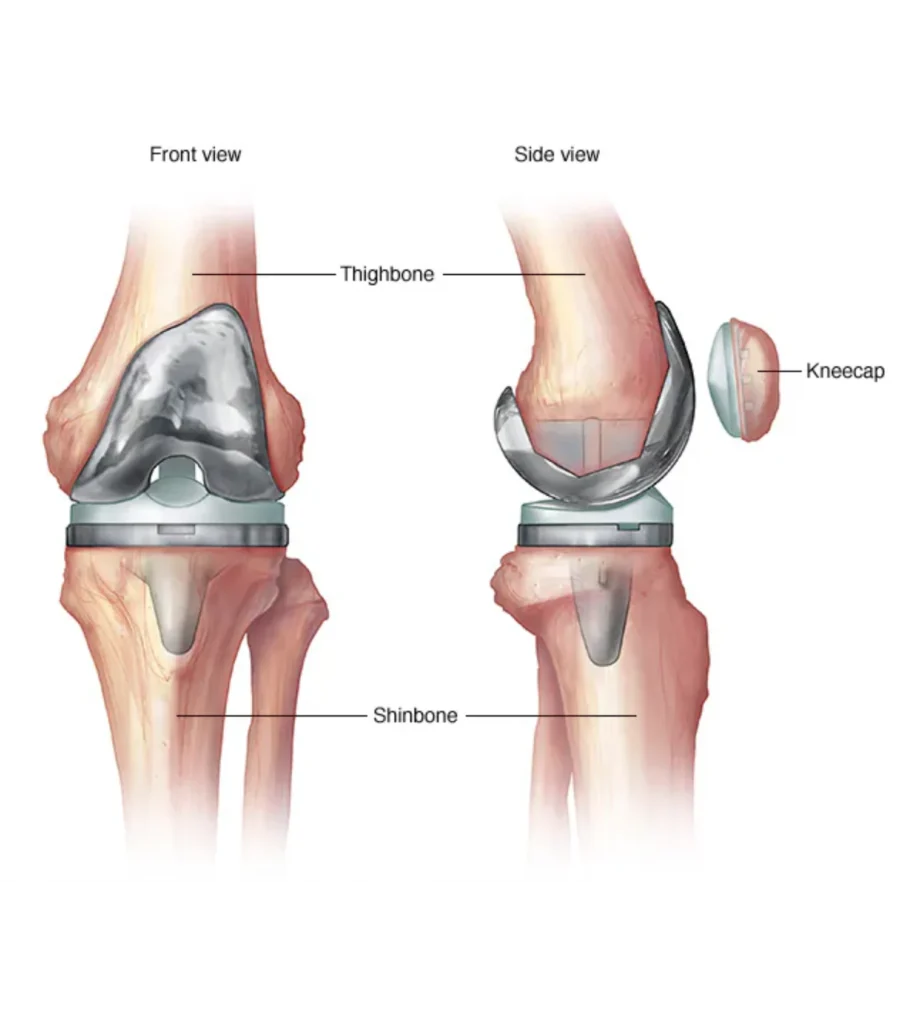
Total Knee Replacement in Hyderabad: Advanced Care at Lux Hospitals
Knee pain due to arthritis, injury, or degeneration can severely impact your mobility and quality of life. For those experiencing chronic knee pain, Total Knee Replacement (TKR) may offer an effective solution. At Lux Hospitals in Hyderabad, we specialize in providing advanced, minimally invasive total knee replacement surgeries, allowing patients to regain their freedom of movement and improve their overall quality of life. Our expert orthopedic surgeons ensure personalized care and offer both traditional and robotic-assisted techniques for the best possible outcomes.
What is Total Knee Replacement?
Total Knee Replacement (TKR) is a surgical procedure where the damaged or worn-out parts of the knee joint are replaced with prosthetic components made of metal, plastic, or ceramic. This surgery is typically recommended for individuals with knee arthritis or those experiencing severe pain and stiffness in the knee joint. It is one of the most common orthopedic surgeries and has a high success rate in providing relief from pain, improving joint function, and restoring mobility.
Types of Total Knee Replacement
There are several types of Total Knee Replacement procedures available, and the choice depends on the patient’s condition and needs:
- Traditional Total Knee Replacement: The entire knee joint is replaced with artificial components.
- Partial Knee Replacement: Only the damaged part of the knee is replaced, sparing the healthy areas.
- Robotic-Assisted Total Knee Replacement: A more precise procedure using robotic technology for better alignment and quicker recovery.
Symptoms of Total Knee Replacement
Symptoms that indicate the need for a Total Knee Replacement include:
- Severe knee pain that limits daily activities such as walking, climbing stairs, or standing.
- Persistent knee stiffness or inability to fully extend or bend the knee.
- Knee swelling or inflammation that doesn’t improve with rest or medication.
- Difficulty walking or bearing weight on the knee.
- Deformity of the knee joint, such as bowing inward or outward.
Diagnosis and Preparation for Total Knee Replacement
Before undergoing Total Knee Replacement surgery, a thorough diagnosis and preparation are essential for optimal outcomes.
Diagnosis
- Physical Examination: Your orthopedic surgeon will conduct a detailed physical examination to assess your knee’s range of motion, strength, and stability.
- Imaging Tests: X-rays or MRI scans will be performed to evaluate the extent of damage to the knee joint and help the surgeon plan the surgery accordingly.
- Blood Tests: Pre-operative blood tests are done to ensure that you are healthy enough for surgery.
- Pre-surgical Assessment: If you have any existing medical conditions, such as diabetes, heart disease, or obesity, these will be assessed to minimize the risk of complications during surgery.
Preparation
- Consultation with the Surgical Team: You will have a detailed consultation with your orthopedic surgeon to discuss the procedure, the type of knee replacement best suited for you, and the expected recovery timeline.
- Preoperative Instructions: You will be provided with instructions on fasting before surgery, discontinuing certain medications, and other steps to ensure a smooth procedure.
- Anesthesia Consultation: An anesthesiologist will assess your medical history and discuss the anesthesia options for your surgery, including general anesthesia or spinal anesthesia.
- Physiotherapy: In some cases, pre-operative physiotherapy may be recommended to strengthen the muscles around your knee and prepare for post-surgery rehabilitation.
Procedure of Total Knee Replacement Surgery
Procedure Details
The Total Knee Replacement procedure typically lasts between 1 to 2 hours and is performed under general or spinal anesthesia, ensuring that you are pain-free during the surgery. Here’s a step-by-step look at what happens during the procedure:
- Incision: The surgeon makes a small incision (about 6-10 inches) on the front of the knee to access the joint.
- Removal of Damaged Tissue: The damaged cartilage and bone from the knee joint are carefully removed.
- Placement of Prosthetic Components: Artificial components made of metal, ceramic, or plastic are fitted to replace the damaged parts of the knee. The components are designed to mimic the natural movement of the knee joint.
- Alignment: The prosthetic components are carefully aligned to ensure proper functioning and stability. If you are opting for a robotic total knee replacement, advanced robotic systems are used to ensure even more precise placement and alignment of the components.
- Closing the Incision: Once the prosthesis is in place, the incision is closed with sutures or staples. A sterile dressing is applied to the surgical site.
Post-Surgery Care and Recovery
- Immediate Post-Op Care: After surgery, you will be monitored in the recovery room until the anesthesia wears off. Pain management will be provided through medications and possibly nerve blocks.
- Physiotherapy: Early physiotherapy is critical to recovery. Physical therapy exercises will begin within a day or two after surgery to improve flexibility, strength, and mobility.
- Hospital Stay: Most patients stay in the hospital for about 2-3 days after the surgery, depending on their progress.
- Follow-up Appointments: Regular follow-up appointments will be scheduled to monitor your recovery and ensure the knee is healing as expected.
Complications of Total Knee Replacement
While Total Knee Replacement surgery is generally safe, there are potential complications that patients should be aware of:
- Infection: Infection at the surgical site or in the knee joint is a possible risk.
- Blood Clots: There is a risk of developing blood clots in the legs after surgery, which can lead to serious complications.
- Implant Failure: In rare cases, the artificial components may wear out or loosen over time, requiring revision surgery.
- Knee Stiffness: Some patients may experience difficulty in moving the knee joint post-surgery, but this is usually temporary and can be improved with rehabilitation.
Why Choose Lux Hospitals for Total Knee Replacement in Hyderabad?
At Lux Hospitals, we are committed to providing world-class care for total knee replacement. Here’s why patients choose us for their knee surgery:
- Expert Orthopedic Surgeons: Our surgeons are highly experienced in performing Total Knee Replacement surgeries with advanced techniques like robotic-assisted knee replacement.
- Cutting-Edge Technology: We use state-of-the-art technology and equipment for precise diagnosis and surgery.
- Comprehensive Care: From pre-operative consultation to post-surgery rehabilitation, we provide personalized care to ensure the best outcomes.
- Recovery-Focused: Our focus is not just on surgery, but on ensuring a smooth and effective recovery to restore your knee function.
Testimonials
"Knee problems"
Took my grandmother to Dr Kishan for her knee problems and we had an excellent consultation. Dr Kishan explained the problem in detail patiently and made sure my grandmother knew all the options and remedies she had available to her. It was really helpful!

Sai Charan B
"Surgery was a success, i am able to walk"
I got meniscus tear while playing foot ball, Dr sai kishan has performed Arthroscopic medial meniscus repair. Surgery was a success, i am able to walk and do all my regular activities . Thank you

Shreyans Jain . 40
"Leg fractured while playing."
I got my leg fractured while playing. Dr Sai kishan sirasala took extreme care and did surgery for my leg. As of now recovery is good . Highly recommend DR sai kishan for any orthopedic issues.

Ranjit Sahoo
"ACL reconstruction surgery "
I have got ACL reconstruction surgery by Dr Sai Kishan. It's been 3 months and I am completely normal and back to my activities. Very good experience

Tejas Gomase
Latest Health Articles by Lux
Frequently Asked Questions
Most patients take 3-6 months to fully recover, but significant improvements in pain relief and mobility are usually seen within the first 3 months.
The surgery itself is performed under anesthesia, so you won’t feel any pain during the procedure. Post-operative pain is managed effectively with medication.
Most knee implants last for 15-20 years, depending on the patient's activity level and overall health.
Yes, most patients are able to walk with assistance within 1-2 days of surgery.
Robotic-assisted knee replacement offers enhanced precision and faster recovery for some patients, but the best option depends on your specific condition and needs.
The expected cost of Total Knee Replacement (TKR) surgery in Hyderabad varies based on factors like the type of procedure, implant quality, hospital facilities, and surgeon expertise.
You can secure a slot by calling the Hyderabad branch directly, scheduling an appointment thorugh online via Lux Hospitals’ official website, or visiting the hospital in person to book your appointment.




















